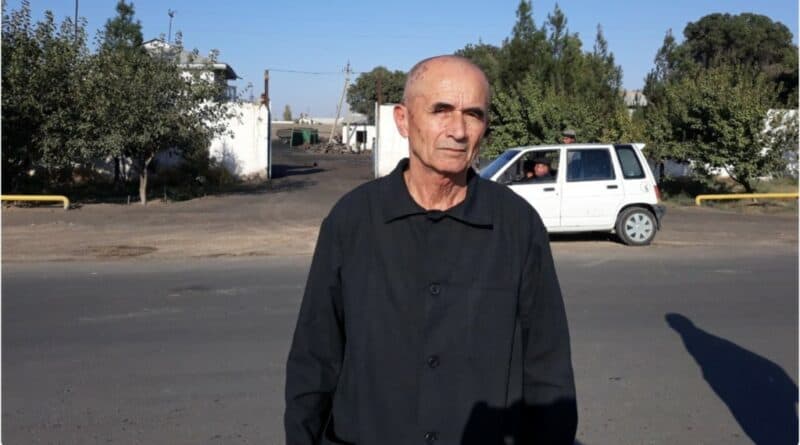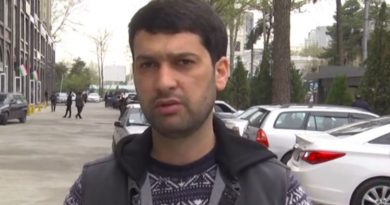Human rights activist from Uzbekistan stands up for political prisoners and refugees
In his application to Diego Garcia-Sayan, UN Special Rapporteur on the independence of judges and lawyers, human rights activist Agzam Turgunov made a series of strong statements about the neglect of the rights of political prisoners and political refugees.
He noted that “previously convicted persons on politically motivated sentences cannot achieve a review of their sentences and, therefore, have no prospects for further rehabilitation”.
Agzam Turgunov was imprisoned three times on the basis of trumped-up charges: in 1971, from 1997 to 2000, and also from 2008 to 2017. After the third release, Turgunov has been brought to administrative responsibility three times over the past three years due to charges of photographing the picket. As a result, Agzam Turgunov has eight convictions, and attempts to appeal them have so far failed.
According to the human rights activist, in the same situation is a former political prisoner Samandar Kukanov. He spent 24 years in prison, that is, an almost 25-year maximum term. He was released in 2016 and soon sued, hoping for rehabilitation. Further, it turned out that the criminal case materials on the wording of the official response of the Tashkent Regional Court were “destroyed in an appropriate manner” and his demand for full rehabilitation is not subject to consideration.
An even more sad situation is with the former deputy of the parliament of Uzbekistan Murad Juraev. He spent five consecutive terms in prison, for a total of 21 years. Two years after his release, Juraev died, because the authorities refused him to leave for treatment in Germany. Of his five sentences, duplicates of two could not be obtained. “Unfortunately, post-mortem rehabilitation is also poorly regulated,” the human rights activist concludes.
Agzam Turgunov is denied to register a public organization, but a group of like-minded people are constantly monitoring cases of former political prisoners: Dilmurod Sayid, Azam Farmonov, Chuyan Mamatkulov, Bobomurod Abdullaev, Israil Holdorov. Akram Malik, Rustam Abdumannapov and others still remain in places of detention. In total, the cases of 63 former prisoners are documented, the sentences of which human rights activists consider politically motivated.
Tens of thousands of Uzbek citizens are forced to live outside their country in different countries of the world, many of them are political refugees. Emigration was the only way to avoid being arrested for their beliefs and torture after an unfair trial. The last three years, they have been deprived of their citizenship, without informing and depriving them of a chance to appeal the decisions.
Deprivation of citizenship is carried out on the basis of the presidential decree “On the loss of citizenship of the Republic of Uzbekistan”, signed by Islam Karimov on June 16, 2014, in violation of the Constitution of Uzbekistan and obligations under the country’s international human rights agreements.
Dissidents are put on the international wanted list, abusing the mechanisms of Interpol. Confiscation of property takes place out of court, it is sold at a lower cost. This is often done in the mercenary interests of officials, eliminating the possibility of challenging such decisions.
Statistics on deprivation of citizenship, prosecution through Interpol and confiscation of property are classified. Lawyers in Uzbekistan, representing refugees, are helpless. They are not provided with the necessary case materials; pressure is being exerted by law enforcement agencies.
Correspondence trials have become a source of illegal use of official authority by representatives of authorities and are of a contract nature. The defendants in such processes are usually dissidents, critics of the regime, investors and people who have shown an elementary desire to defend themselves.
In his appeal, Agzam Turgunov emphasizes the situation of members of Ataev’s family (political emigrants) who received asylum in France. For 15 years their case has been classified. The trial was held in absentia and secretly. In particular, Alim Ataev and his daughter Nadejda Ataeva were accused without serious reason. The court didn’t order a single examination, but referred to 55 witnesses who were not in court. It turned out that among them there are deceased and those who changed their surnames and citizenship. Testimonies appear in the materials of the criminal case collected by investigators dismissed for official crimes and forgery. So far, the Ataevs have not been charged, but in violation of all procedural rules, the authorities condemned them and confiscated all their property.
Agzam Turgunov touched upon other aspects of human rights violations in Uzbekistan, making recommendations. As he told the ACCA journalist, the text of the appeal was accepted on September 22 by the assistant to the special rapporteur, confining himself to a brief conversation, as Mr. Diego Garcia-Sayan was unwell.
On September 25, the special rapporteur held a press conference at which he told reporters that he was “concerned about the constant and ubiquitous presence in the Uzbek society of security forces, as well as the overly broad powers of prosecutors in criminal trials that limit the ability of judges to make independent decisions. The government should do its best to complete the reform process (justice system) as soon as possible”.




